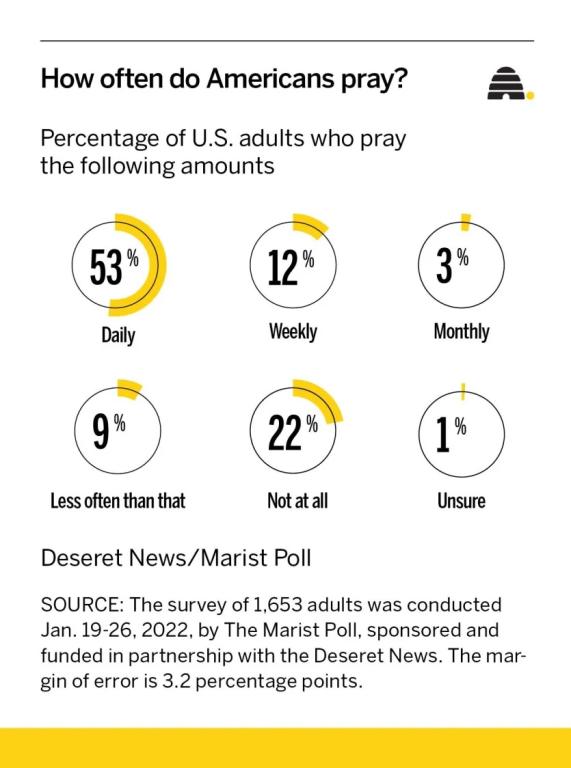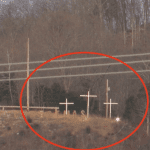We’ve all heard the headlines. Church membership is dropping. Secularization is rising. Religious activities no longer anchor the average American’s social life.
And yet a new survey from the Deseret News and Marist Poll shows that the story of faith in America is far more complicated — and nuanced — than a simple narrative of decline. Among many groups, faith is thriving, resilient and even on the rise.
According to the new research, the share of Americans who pray regularly is high and holding steady. Especially among Black Americans, religious disengagement is the exception, not the rule.
The vast majority of Americans still believe in a higher power, and a majority believe in the biblical God. Despite the common assumption that Democrats are godless, nearly two-thirds of members of the party believe in God and 24 percent attend church at least once a week.
Furthermore, most people continue to see faith as a good thing. Nearly 7 in 10 U.S. adults think the country would be better off if Americans prayed for each other. Just 37 percent say it’s hard for people who don’t believe in God and people who do believe in God to get along, the new poll reports.
Taken together, these findings show that the U.S. remains a very religious country, especially compared to other industrialized nations. But it’s clear that a renegotiation is underway as people grow less willing to make strong religious commitments and more interested in doing things their own way, says Daniel Cox, the director of the Survey Center on American Life and a research fellow at the American Enterprise Institute.
“We’ve gotten used to the ability to pick and choose what pieces of things we like. With our online dating profiles and social media profiles, we pick which people to engage with and what information or materials we want to see,” he says.
Young people, in particular, aren’t interested in making the sort of sacrifices that church membership demands. They may respect the moral wisdom of religious traditions, but fewer are heeding the religious call to build a community-focused life.
The younger you are, the less likely you are to believe in God, describe yourself as spiritual or regularly pray, notes Michael Conte, a research analyst for Marist Poll who worked with the Deseret News on the survey.

The modern affinity for do-it-yourself faith helps explain why, according to the new survey, just one-third of U.S. adults (34 percent) believe it’s necessary to be religious to live a moral life. It also likely plays a role in the rise of loneliness, the fall of life satisfaction and the widespread belief that America’s moral compass is pointed in the wrong direction. “People need and crave community,” Cox says.
Organized religion can fulfill that craving for people if they’ll give it a chance. As it stands, religiously disengaged Americans seem more interested in talking about the value of faith than embracing it themselves, according to Conte.
“It’s a ‘Do as I say, not as I do’ type of thing,” he says.
Most researchers date the beginning of organized religion’s current decline to the mid-1990s. That’s when surveys began showing a notable uptick in the number of nonreligious adults.
“There was a decline in religious affiliation and participation,” Cox says. From 1995 to 2021, the share of Americans who identified as religious “nones” jumped 15 percentage points, from 6 percent to 21 percent, according to Gallup polls.
At first, many scholars thought the scope of the religious shift would be limited to people’s self-identification and church attendance rate. The assumption was that, even as the country disconnected from religious institutions, Americans would continue to practice their faith at home.
But recent research shows that religious beliefs have changed, too, albeit to a lesser extent than affiliation and attendance. Although overall belief in God is high, the share of U.S. adults who believe in God as described in the Bible has fallen to 54 percent. Fifteen percent of Americans say they don’t believe in God but, instead, some sort of higher power or spiritual force, according to the new Deseret-Marist poll. It was fielded in January 2022 among 1,653 U.S. adults. The margin of error is 3.2 percentage points.
In general, Americans are increasingly willing to express doubt about the existence of God. There’s also growing acceptance of the idea that you can be moral even if you don’t have faith, Cox says. “People are changing how they think about the importance of raising kids in a religion and the connection between faith and morality. Negative views about atheists are on the decline.”
These trends are present within essentially all demographic groups, but members of some races, generations, political parties and religious communities are more likely to be religiously disengaged than others. For example, Democrats are nearly half as likely as Republicans to attend religious services at least weekly, the new research showed. Nearly two-thirds (63 percent) of women pray daily, compared to fewer than half (44 percent) of men.
As Conte noted, young people are much less likely than older Americans to attend worship services or profess belief in God. The survey also found that Americans ages 18 to 29 are less likely to describe themselves as spiritual than older adults.
“I was thinking we’d see younger people describe themselves as spiritual but not religious. It was interesting to see they were also lowest on the spirituality question,” Conte says.
On the flip side, Black Americans stand out for their high levels of religious commitment. Nearly half of Blacks say they attend church at least weekly and two-thirds pray every day. Three-quarters of Black Americans believe in God as described in the Bible, compared to just half of whites and Latinos, according to the new poll.
But even these high figures represent a notable drop from where the Black community was in the past. “We are seeing increasing disaffiliation across the board,” Cox says.
These various trends affecting organized religion are part of a broader transformation taking place in American culture. People today are less civically minded than they used to be, which leads them to prioritize individual pursuits over community ties, according to Cox.
“There’s been a real shift away from community and civic organizations toward personal endeavors,” he says, adding that, although parents spend more time with their kids today than in the past, families are less likely to attend neighborhood events or eat dinner together.
The widespread breakdown in the social fabric helps explain why many Americans were feeling lonely and burnt out even before the COVID-19 pandemic began. It’s clear that culture’s embrace of personal independence has come at a cost, Cox says.
“All the research shows that being part of a community, being married, being part of a church or religious organization, that all of these are associated with greater satisfaction in your personal life,” he says, adding that even tiresome social obligations can, counterintuitively, be a big source of joy.
“I’ve heard this over and over again when I’ve interviewed Latter-day Saints. Demanding church-related schedules end up feeling rewarding. That is really true,” Cox says.
It’s also true that Americans recognize the value of a strong social support system, regardless of whether they have one themselves. Nearly 9 in 10 U.S. adults, including 84 percent of those who do not practice a religion, agree that it’s important to be part of a close-knit community, the new poll found.
These findings point to a potential sales pitch for churches to make as they try to attract new attendees and members. Faith leaders can emphasize the social aspect of organized religion, reminding people that religious communities share more than a set of beliefs.
“One of the things religious congregations do is to bring people together,” says Bob Smietana, author of the forthcoming book “Reorganized Religion: The Reshaping of the American Church and Why It Matters.” “If you’re in crisis, that’s the folks who are there to help.”
Other potential sources of community rarely have the same type of unifying or nurturing power, Cox says. You may gain friends from joining a video game club or professional connections from a parent-teacher organization, but those groups won’t be able to rally to support you in times of need in the same way that churches do.
“I can’t imagine the type of community created through video games is as effective in terms of creating a sense of meaning and belonging as houses of worship,” Cox says.
Despite faith groups’ relative strengths, efforts to attract new members often fall on deaf ears. Some Americans aren’t ready to forgive religious leaders for ongoing crises stemming from abuses of power, says Smietana, who is also a national reporter for Religion News Service.
“Organized religion has a bad rap. And that’s, in part, because of its own problems,” he says.
Other Americans believe their own values and goals are out of step with the moral vision that’s promoted within most faith communities. They’re rejecting churches’ current teachings in addition to their actions in the past, Cox says.
“For many folks, there’s some amount of distrust of religion. There’s some amount of assumption that the values of a lot of places of worship are not consistent with their own values,” he says.
These observations help explain why many Americans are disengaged from faith groups despite expressing interest in strengthening their community ties. When considered alongside young people’s particular disinterest in attending church, it becomes clear that time may be running out to stop organized religion’s decline.
“Being secular is a much more permanent state than I think we initially thought,” Cox says.
If there’s one bright spot or faith leaders in the new Deseret-Marist poll, it’s that many Americans are dissatisfied with where the country stands today.
Overall, more than 7 in 10 U.S. adults (72 percent) believe the country’s moral compass is pointed in the wrong direction. Nearly as many Americans (68 percent) say we’d be better off if more people prayed for each other.
“I thought we’d see a big difference by age group on morality questions. It’s interesting that the belief that things are going in the wrong direction is not tied to someone’s age or religious stance,” Conte says.
Whether people realize it or not, their pessimism about the country’s moral compass likely has something to do with the current state of faith. For centuries, organized religion served as America’s moral backbone and social safety net, Smietana says. Now, that longtime support network is losing strength.
“We still rely on organized religion” to feed the hungry, resettle refugees, provide financial assistance to the poor and do any number of other things, he says. But it’s running out of resources to do this “good and important” work.
Over the course of the pandemic, many houses of worship saw further membership decline and drops in financial donations. Faith leaders struggled to keep their congregations united when holding in-person events was deemed to be unsafe.
But, over the same period, religious organizations showed how valuable they can be to the rest of the country. Without faith-based food drives and other religiously motivated service projects, it’s hard to imagine how much more suffering there would have been, Smietana says.
“The pandemic gave us the chance to see the benefits of organized religion,” he says.
The challenges of the past two years also enabled religious communities to test new ways of connecting with people, which could serve them well in the years ahead, Cox says.
“Online faith communities could really open the door to folks. If you’re a little bit suspicious of what being part of a religious community entails, virtual services are an easy and safe way to engage and explore,” he says.
Whether or not that strategy works, Cox and others believe faith groups need to focus on bringing spiritual-but-not-religious and believing-but-not-attending Americans back into the religious fold. Without the community aspect, faith becomes a much less formative force in people’s lives.
“If religious practices become something people mostly do by themselves, religion becomes a very different thing,” Cox says.
Article by Kelsey Dallas. This story appears in the April issue of Deseret Magazine.


